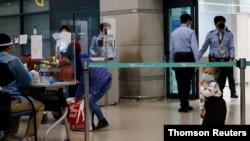South Korea announced Monday that it will extend a ban on direct flights from Britain until January 7 after three people who recently entered the country tested positive for the COVID-19 variant that was first identified in Britain.
The Korea Disease Control and Prevention Agency says the trio arrived on December 22 after a flight from London, making them the first known cases of the new version detected in South Korea.
Japan, which reported its first case of the virus variant, banned all non-resident foreigner arrivals from midnight Monday through the end of January.
Effective Monday, U.S. authorities said passengers arriving from Britain must test negative for COVID-19 72 hours before departure.
Vaccine headed for approval
British authorities are expected to approve the AstraZeneca coronavirus vaccine this week, and the head of the company said it will be as effective against the virus as the Pfizer-BioNTech and Moderna vaccines.
AstraZeneca chief executive Pascal Soriot told the Sunday Times the company has “figured out the winning formula and how to get efficacy that, after two doses, is up there with everybody else.”
He added that he believes his company’s vaccine will also be effective against the new variant of the virus, which is more contagious and causing concern worldwide.
If approved, AstraZeneca’s vaccine will become the fifth to have been rolled out to fight the virus. Early tests showed that the vaccine was 70% effective for preventing illness, compared to 95% reported by Pfizer and its German partner BioNTech. Russia and China also have their own vaccines.
The latest vaccine on the horizon comes as the world reached the grim milestone of 80.8 million people worldwide infected by the virus with 1.7 million world deaths globally, according to the Johns Hopkins University.
In the United States, 19 million people have been infected with the virus and more than 333,000 have died.
Meanwhile, the pandemic has prompted authorities in Australia to ban people from attending one of the world’s most iconic New Year’s celebrations.
New South Wales Premier Gladys Berejiklian announced Monday that Sydney Harbor would be closed to the public Thursday night, New Year’s Eve, to prevent the disease from spreading outside the city’s Northern Beach suburbs. A total of 125 people in that neighborhood have tested positive for COVID-19, the disease caused by the coronavirus, since mid-December, including five new cases recorded Monday.
The annual New Year’s observance features a spectacular fireworks display that lights up the nighttime skies over Sydney’s famous Opera House. At least 1 million people are normally in attendance, but Premier Berejiklian said the safest way for Sydney residents to view the fireworks show is from home, on television.






